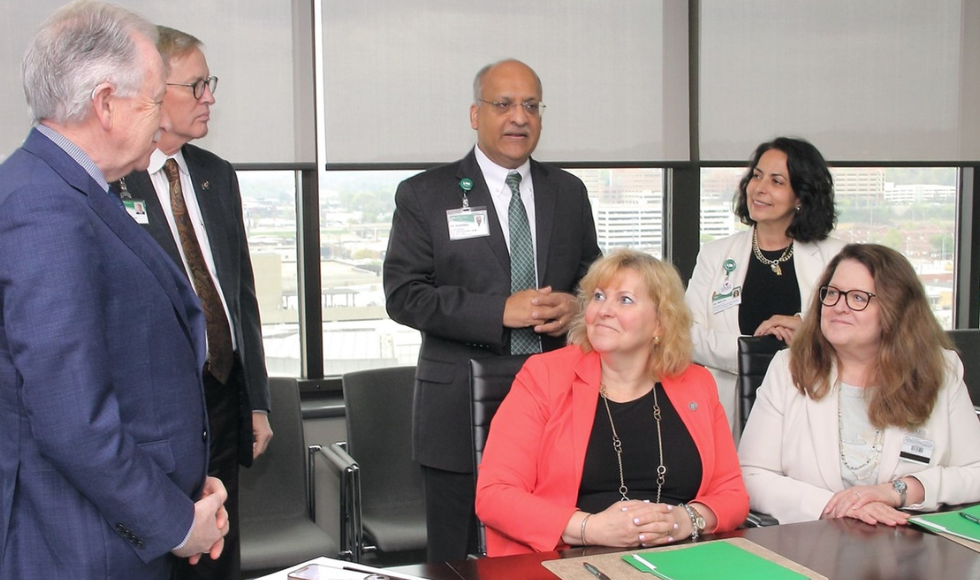McMaster, University of Alabama at Birmingham deepen ties and explore further partnerships

Senior academic leaders from McMaster University and the University of Alabama at Birmingham (UAB) sign a Memorandum of Understanding at the UAB campus this spring. From left: Paul O'Byrne, dean and vice-president of McMaster’s Faculty of Health Sciences; Chris Brown, UAB’s vice-president for Research; Anupam Agarwal, senior vice-president for Medicine and dean of the Heersink School of Medicine at UAB; Susan Tighe, McMaster provost and vice-president (Academic); Shadi Martin, dean of the UAB Graduate School; and Janet Woodruff-Borden, UAB senior vice-president of Academic Affairs and provost.
BY Chantall Van Raay
May 22, 2024
McMaster University strengthened its growing partnership with the University of Alabama at Birmingham (UAB) by signing a Memorandum of Understanding to foster further collaboration between the two institutions.
McMaster and UAB committed to strategic investments in partnerships, building on their successful track records in commercialization and clinical impact.
The agreement, signed this spring at UAB, also sets the stage for the exploration of joint degrees, research collaborations, global health initiatives and other innovations.
“This memorandum signifies our strengthened alignment with the University of Alabama at Birmingham and an exciting foundation to extend global impact,” says Paul O’Byrne, dean and vice-president of the Faculty of Health Sciences at McMaster.
“Our schools share similar philosophies and principles in research, education, and clinical impact, and by working collaboratively, we envision enormous potential across both institutions.”
The partnership stems from a $32-million donation in 2022 from Marnix Heersink, an Alabama physician and entrepreneur, to boost McMaster University’s role as a hub for biomedical innovation, entrepreneurship and global health.
 The gift established new initiatives at McMaster, including the Marnix E. Heersink School of Biomedical Innovation and Entrepreneurship to educate the next generation of entrepreneurial health innovators and the Mary Heersink Program in Global Health, named for his wife, to create new solutions addressing emerging trends and threats to global health, such as pandemics and the climate crisis.
The gift established new initiatives at McMaster, including the Marnix E. Heersink School of Biomedical Innovation and Entrepreneurship to educate the next generation of entrepreneurial health innovators and the Mary Heersink Program in Global Health, named for his wife, to create new solutions addressing emerging trends and threats to global health, such as pandemics and the climate crisis.
Heersink will receive an honorary degree at the May 22 Faculty of Health Sciences convocation ceremony.
Convocation 2024: Meet the honorary degree recipients
“This collaboration represents a significant step forward in our commitment to addressing global health challenges and fostering innovative solutions that can make a meaningful difference in our communities,” says Susan Tighe, McMaster provost and vice-president (Academic).
“It aligns well with our broader university priorities of excellence in research, education, and community impact.”
The two institutions are well placed to work collaboratively, says Anupam Agarwal, senior vice-president for Medicine and dean of the UAB Marnix E. Heersink School of Medicine.
“McMaster and UAB share many complementary strengths, including the excellence of our Faculties, our research enterprises, and our health professions training programs,” Agarwal said.
“Formalizing our partnership in this way represents an exciting next step toward realizing the vast potential of our collaborative endeavours to advance health and healing in our respective home countries and across the globe.”
Some of the opportunities presented within the MOU include:
- Developing stackable certificate programs that could allow students to take courses at both institutions and earn a joint master’s degree, augmenting shared training of health professionals and scientists.
- Developing cohort studies that examine racial disparities in stroke, cognitive decline, and diet/hypertension impacts and consider partnerships in global surgery.
- Creating opportunities in women’s health that enhance existing collaborations and open new opportunities, including a multi-country peripartum cardiomyopathy trial and a preeclampsia trial.
- Enhancing innovation, entrepreneurship, and commercialization of research discoveries through AI/machine learning initiatives to train the future healthcare workforce.
- Building capacity in clinical applications of radiopharmaceuticals.


